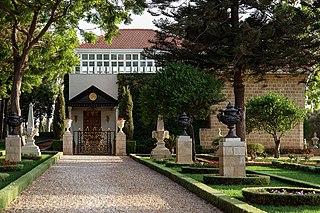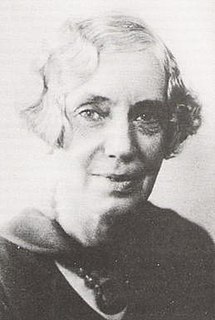Covenant-breaker is a term used by Bahá'ís to refer to a person who has been excommunicated from the Bahá'í community for the act of covenant-breaking, roughly defined as active opposition to the Bahá'í Faith from a current member. According to Bahá'í law, only the head of the religion, currently the Universal House of Justice, has the authority to declare a person a covenant-breaker.

Ásíyih Khánum was the wife of Bahá'u'lláh, the founder of the Bahá'í Faith. She is viewed by Bahá’ís as the paragon of a devoted mother and wife. She is also known by her titles of Navváb, the Most Exalted Leaf, Búyúk Khánum or Hadrat-i-Khánum. Khánum is a title usually given to a Persian lady and is equivalent to madam. Bahá’u’lláh and Ásíyih Khánum were known as the Father of the Poor and the Mother of Consolation for their extraordinary generosity and regard for the impoverished. Bahá'u'lláh, along with Ásíyih Khánum and her children, are regarded as the Bahá'í holy family.
The Hands of the Cause of God, Hands of the Cause, or Hands (informally) were a select group of Bahá'ís, appointed for life, whose main function was to propagate and protect the Bahá'í Faith. Unlike the members of the elected institutions and other appointed institutions in the Bahá'í Faith, who serve in those offices, Hands are considered to have achieved a distinguished rank in service to the religion.
The following is a basic timeline of the Bábí and Bahá'í religions emphasizing dates that are relatively well known. For a more comprehensive chronology of the timeline, see the references at the bottom.
The Bahá'í Faith has had challenges to its leadership, usually at the death of the head of the religion. The vast majority of Bahá'ís have followed a line of authority from Bahá'u'lláh to `Abdu'l-Bahá to Shoghi Effendi to the Custodians to the Universal House of Justice. Sects diverging from this line of leadership have failed to attract a sizeable following. In this sense, there is only one major branch of the Bahá'í Faith, represented by at least 5 million adherents, whereas the groups that have broken away have either become extinct with time, or have remained very small in number, representing far less than 0.1% of all Bahá'ís. Globally the Bahá'í community has maintained its unity.
The Dawn-Breakers: Nabíl’s Narrative of the Early Days of the Bahá’í Revelation or Nabíl's Narrative (Táríkh-i-Nabíl) is a historical account of the early Bábí and Bahá'í Faiths penned by Nabíl-i-A`zam in 1887–88. The English translation by Shoghi Effendi was published in 1932.
Mullá Muḥammad-i-Zarandí, more commonly known as Nabíl-i-A’ẓam or Nabíl-i-Zarandí, was an eminent Bahá'í historian during the time of Bahá'u'lláh, and one of the nineteen Apostles of Bahá'u'lláh. He is most famous for authoring The Dawn-Breakers, which stands out as one of the most important and extensive accounts of the ministry of the Báb.
Bahá'í literature, like the literature of many religions, covers a variety of topics and forms, including scripture and inspiration, interpretation, history and biography, introduction and study materials, and apologia. Sometimes considerable overlap between these forms can be observed in a particular text.

Ḥájí Mírzá Muḥammad-Taqí, known as Ibn-i-Abhar, was an eminent follower of Bahá'u'lláh, the founder of the Bahá'í Faith. He was appointed a Hand of the Cause and identified as one of the nineteen Apostles of Bahá'u'lláh.

Mírzá `Alí-Muḥammad-i-Khurásání, known as Ibn-i-Aṣdaq, was an eminent follower of Bahá'u'lláh, the founder of the Bahá'í Faith. He was appointed a Hand of the Cause and identified as one of the nineteen Apostles of Bahá'u'lláh.

Hájí Mírzá Ḥasan-i-Adíbu'l-`Ulamá, known as Mírzá Ḥasan or Adíb, was an eminent follower of Bahá'u'lláh, the founder of the Bahá'í Faith He was appointed a Hand of the Cause and identified as one of the nineteen Apostles of Bahá'u'lláh.
Shaykh Káẓim-i-Samandar, known as Samandar, was an eminent follower of Bahá'u'lláh, the founder of the Bahá'í Faith. He was born to a prominent Bahá'í family of Qazvin of Bábí and Shaykhi background. Favored by Bahá'u'lláh, he was identified as one of his nineteen Apostles.
Shaykh Muhammad Alíy-i-Qá'iní was the nephew of Nabíl-i-Akbar, another apostle of Bahá'u'lláh. As a young man engaged in religious studies in Mashhad, he encountered the Bahá'í Faith and soon became an ardent believer. He became a close companion of his uncle Nabíl until the latter's death in 1892. In 1903, Shaykh Muhammad Alí was instructed to accompany Mírzá Hasan-i-Adíb to India, but on the he was caught up in the persecution against the Bahá'ís in Isfahán. He was stripped of his clothes, severely beaten and fortunate to escape with his life. He had to return to Tihrán, but later reached India and stayed there for a year and a half. He then traveled to Haifa. There 'Abdu'l-Bahá sent him to Ishqábád to take care of the education of children there. Apart from journeys he made for the service of the faith, he stayed in Ishqábád for the rest of his life. After the death of Mírzá Abu'l-Fadl-i-Gulpáygání, Shaykh Muhammad Alí was called to Haifa to complete, with the help of others, the unfinished writings of Mírzá Abu'l-Fadl, leaving for Ishqábád shortly before 'Abdu'l-Bahá's death. Shaykh Muhammad Alí died in 1924 after a prolonged illness.
Zoroastrianism is recognized in the Bahá'í Faith as one of nine known religions and its scriptures are regarded as predicting the coming of Bahá'u'lláh. Zoroaster is included in the succession of Manifestations of God. The authenticity of the Zend Avesta is seen as uncertain.
The following outline is provided as an overview of and a topical guide to the Bahá'í Faith.













